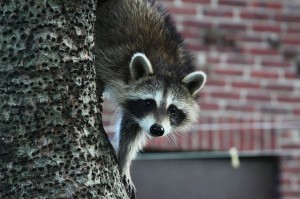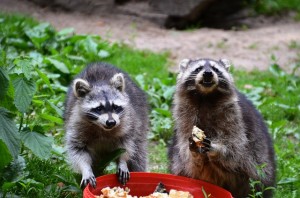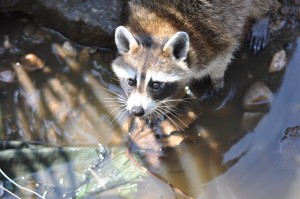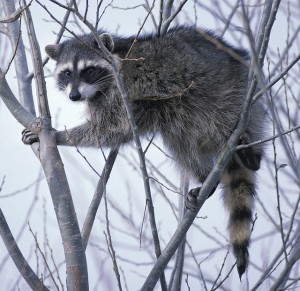If you’ve ever had your garbage can ransacked, you are familiar with raccoons! These creatures are highly adaptable and thrive in both urban areas and the wild. Becoming familiar with raccoons can save you both time and money since these rascals are known to occasionally cause trouble for homeowners. And raccoons, in fact, do not hibernate during winter, contrary to popular belief.
Raccoon Characteristics 
Raccoons are typically known to be loners. Males usually only spend time with females in dens during mating season. One of the only times raccoons will band together is during a particularly cold or harsh winter to help keep warm. Once it warms up, the raccoons head their separate ways.
Raccoon Diet
 Raccoons are certainly not picky eaters; in fact they will eat just about anything. Raccoons are carnivores as well as scavengers. The mainstays of their diet include mice, crabs, fish, frogs, nuts, and seeds. They also love to get into food that humans leave behind. This is why you may find your garbage strewn about if you leave it out overnight.
Raccoons are certainly not picky eaters; in fact they will eat just about anything. Raccoons are carnivores as well as scavengers. The mainstays of their diet include mice, crabs, fish, frogs, nuts, and seeds. They also love to get into food that humans leave behind. This is why you may find your garbage strewn about if you leave it out overnight.
Raccoon Habits
 Perhaps one of the most unusual habits raccoons have is dunking their food in water before eating it. The raccoon’s scientific name is procyon lotor, which actually means “washing bear.” This makes sense considering their odd food-washing habit and bear-like markings. Raccoons are nocturnal animals, meaning they are active at night. Most raccoons spend the day in their dens and as soon as dusk approaches, they head out in search of food. Some places raccoons like to search include farms (crops are a big hit with them), ponds, lakes, and of course your garbage can. As sunrise approaches, raccoons typically call it a night and head back to their den to sleep.
Perhaps one of the most unusual habits raccoons have is dunking their food in water before eating it. The raccoon’s scientific name is procyon lotor, which actually means “washing bear.” This makes sense considering their odd food-washing habit and bear-like markings. Raccoons are nocturnal animals, meaning they are active at night. Most raccoons spend the day in their dens and as soon as dusk approaches, they head out in search of food. Some places raccoons like to search include farms (crops are a big hit with them), ponds, lakes, and of course your garbage can. As sunrise approaches, raccoons typically call it a night and head back to their den to sleep.
Raccoons and Hibernation
 Raccoons do not hibernate in winter. This myth may have started because during very cold days raccoons take refuge in their warm dens. Depending on the climate and weather, raccoons may spend weeks in their dens, living off of their fat stores, until the climate becomes somewhat more mild. When raccoons are sleeping off the cold temperatures, those fat stores keep them alive since they do not eat. This is why raccoons seem to be particularly troublesome in the spring; they’re starving and they want YOUR garbage!
Raccoons do not hibernate in winter. This myth may have started because during very cold days raccoons take refuge in their warm dens. Depending on the climate and weather, raccoons may spend weeks in their dens, living off of their fat stores, until the climate becomes somewhat more mild. When raccoons are sleeping off the cold temperatures, those fat stores keep them alive since they do not eat. This is why raccoons seem to be particularly troublesome in the spring; they’re starving and they want YOUR garbage!
If you suspect racoons may be a problem in your area, or are afraid a racoon has claimed a part of your home as its den, contact us today for a free estimate.
Our staff is trained in the most effective methods for dealing with raccoons, and will evaluate the situation, trap the pests, and repair the damage caused by their stay.



